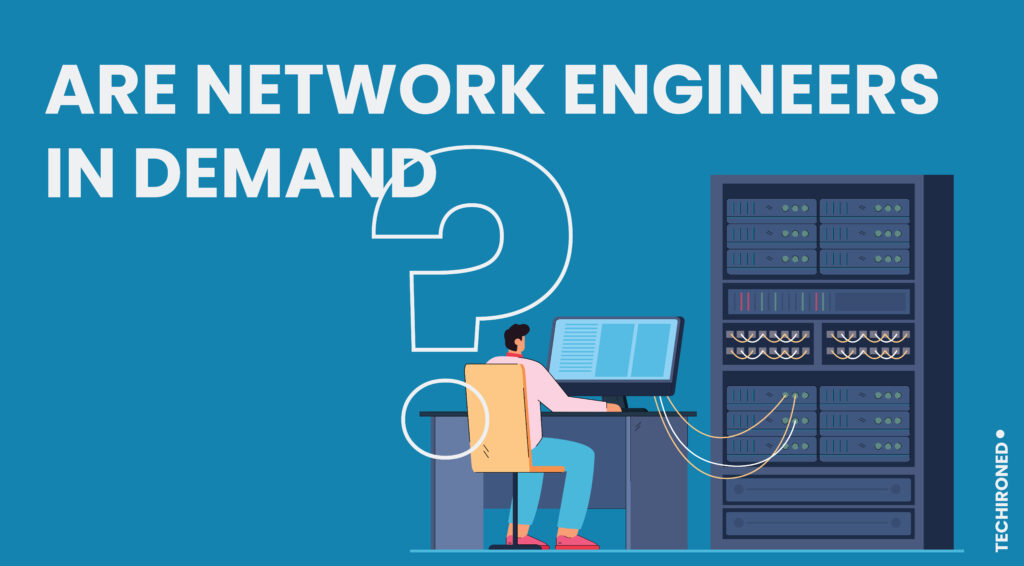Are network engineers in demand? and are you one of them? then you should know your roles and scopes.
One of the IT industry’s highest-paying jobs today is networking, which is in high demand. Will it, however, stay the same?
Many people are currently concerned about whether automation may replace their jobs. Even if software developers use machine learning techniques to make the program more intelligent and effective, IT isn’t immune to this way of thinking. Some people fear that as time passes, the position of network engineer may become obsolete.
This article will examine if these professionals will soon still have a seat at the table.
We shall first define network engineering to go into greater detail about the topic.
Network Engineering: What is it?
The entire computer network connection of a company is designed, built, and run by network architects. The area of network engineering is evolving. Previously, it was primarily focused on maximizing traffic and upholding stability in tiny networks. But now, data, audio, calls, video files, and wireless network services are used to assess network connectivity.
We’ll proceed to the next step to learn more about the Network Engineer, including his duties.
Who is Network Engineer? What are his Responsibilities?
A network engineer is a highly skilled technical professional who manages the connectivity of wireless, audio, and video networks. They also go by the name “network architects.”
Additionally, the network engineer oversees overseeing technical advancements across the entire firm and making sure all systems are functioning as intended while staying current with the always-changing cybersecurity environment to prevent data theft.
Network Engineers are in demand as there are numerous positions and duties that come with being a network engineer, including:
Computer Network Management: Network engineers make sure that all networked devices, including pcs, printers, workstations, and wireless devices, including Internet of Things devices, can communicate and share resources with one another as well as with remote resources, such as the internet.
The goal of network architects is to guarantee sufficient access, and little downtime, and support future network expansion plans. In a word, this function makes sure that a computer network is constantly operational.
Computer Network Framework: A network engineer may oversee coming up with a network design while considering the physical layout of the building and the allotted budget into consideration. The network engineer must create a wide area network for the company if there are several buildings. Network hardware and software upgrades belong to the responsibility of network architects.
A network engineer’s ability to defend and manage the networks of their organizations, comprehend the newest technologies, and make sure their network design is as effective as possible depends on their ability to keep up with technological advancements.
What skills are required for a network engineer?
Most network engineers have backgrounds in computer science, statistics, microelectronics, or a similar field.
Network engineers are employed at all levels of the company; they report directly to the most important parties, help other workers with technical problems, and interact with outside suppliers. In light of this, the most effective professionals are those that have strong communication abilities and take a logical, level-headed approach to solving problems.
The following skills of a network engineer are:
Skills
- knowledge of network operations
- knowledge of network security programs
- Firewall knowledge
- a solid understanding of IP networks
- engineering knowledge of physical networks
- Excellent communication abilities
- strong organizational abilities
- aptitude for solving issues.
- Thinking rationally
- Adaptable
- tolerant to stress
Now, we will discuss what is networking engineering in today’s world.
Today’s Networking Engineering
Networking engineers’ responsibilities and scope can change. The function of a network administrator, who manages the operation and maintenance of the complete infrastructure of linked devices, is by far the most important. Due to the lack of work with dangerously complicated systems, many network administrators find their jobs to be rewarding. In networking, things typically function as intended, making them rather transparent.
The tough work is well compensated, and modern networking engineers are constantly increasing their knowledge of platforms, networks, software applications, and other networking-related topics.
Could automation eliminate their jobs in the future?
Some people believe that automation will eliminate networking engineers’ jobs, however, industry data suggests the exact opposite! Automation will undoubtedly increase in prominence, but networking engineers won’t lose their employment as a result; instead, they’ll simply change how they approach their work and pick up new abilities.
They never stop working!
Because there will always be a need for computer network architects, networking engineers will have great job security even if their position changes. Networking professionals note that networking engineers have always been in transformation. Ten years ago, dial-up internet and cloud computing were both non-existent. However, networking engineers have successfully adapted through time and with improvements in technology. Because of this, network engineering will evolve but its practitioners won’t be replaced.
To compete and be consistent in their jobs, computer network architects must need to acquire new skills.
Network engineers must acquire new skills and combine them.
Engineers will need to create networks in the future that correspond to applications. A modification brought about by an application might improve how data traffic is handled rather than limiting it to conventional infrastructures. In five to ten years, network administrators will be more like developers. Therefore, the time is now to start extending your skill set to include programming languages if you want to stay relevant in the networking industry. In the absence of a bridge, you will probably end up hanging equipment and running cables. This will make it more difficult for you to respond to new networking improvements.
The job of a networking engineer has changed from a more manual type of labor to something more innovative as networks become more automated. The modern networking engineer uses coding languages like Java instead of writing networking programs line by line in order to stay up with new applications.
Greater Simplicity
Earlier, network architects had to put in a lot of effort to configure and build networks; now, automation is expected to relieve a lot of that laborious, occasionally stressful job. They are now concentrating on making the results simpler for the end customers. Businesses need a strong network infrastructure to provide quick, efficient, and effective services. Because of this, there is a growing requirement for networking engineers that are well-versed in backend networks. The job will become considerably less difficult and much more result-based when the next wave of change in the networking industry comes.
What is the Future of Network Engineering?
In the upcoming years, network engineers are expected to see job growth of roughly 4%. That doesn’t mean, though, that the work won’t undergo a significant transformation in the years to come. Network engineers will still be in demand, but as networks increasingly adopt cloud designs, security develops, and how we use these tools changes, employers will be searching for applicants with new talents.
Are Network Engineers Going Extinct?
Simply put, no. The technologies they assist in implementing won’t replace computer network architects, but their roles are changing. Engineers’ workloads will become less cluttered by repetitive, faulty tasks thanks to automation and artificial intelligence (AI), and their responsibilities will change to accommodate new demands and employer expectations.
As has always been the case in computer networking, modification is the key to staying current. Routing and switching, network protocols like TCP/IP, DNS, and DHCP, and various hardware and software configurations are still important concepts that network architects need to understand. To keep up with the development of cloud computing, automation, virtualization, and AI, they must expand those skill sets.
Engineers who master programming languages like Python, which work with free and open-source programmers like Ansible, will have an advantage over their opponents.
Network experts will have their selection of freshly generated positions for network engineers if they can master technologies that can predict network behaviors and make necessary modifications promptly, assuring optimal network performance and stability. Today, it makes sense to upgrade one’s skills in new fields of network engineering including cloud networking, distributed networking, and edge networking by enrolling in advanced degree programs online like SMU’s MSNE. The need for the graduate study could arise in the future.
Conclusion
More than ever, we depend on networks. Although network architecture evolves over time, professional basics remain constant because professions in computer networking have always required lifelong learning. Since change is inevitable, network engineers must actively plan for it to remain relevant. Computing advancements including artificial intelligence, fog, mist, and multi-cloud computing are driving significant changes in the industry.
The proper computer network architects can expand the technology to meet changing needs, create virtual network architecture, and automate procedures to speed up workflows, secure systems against attacks, and boost productivity.

